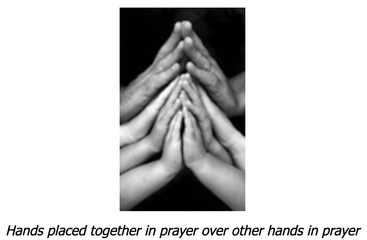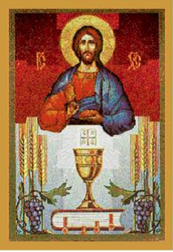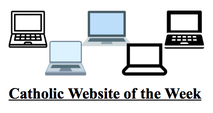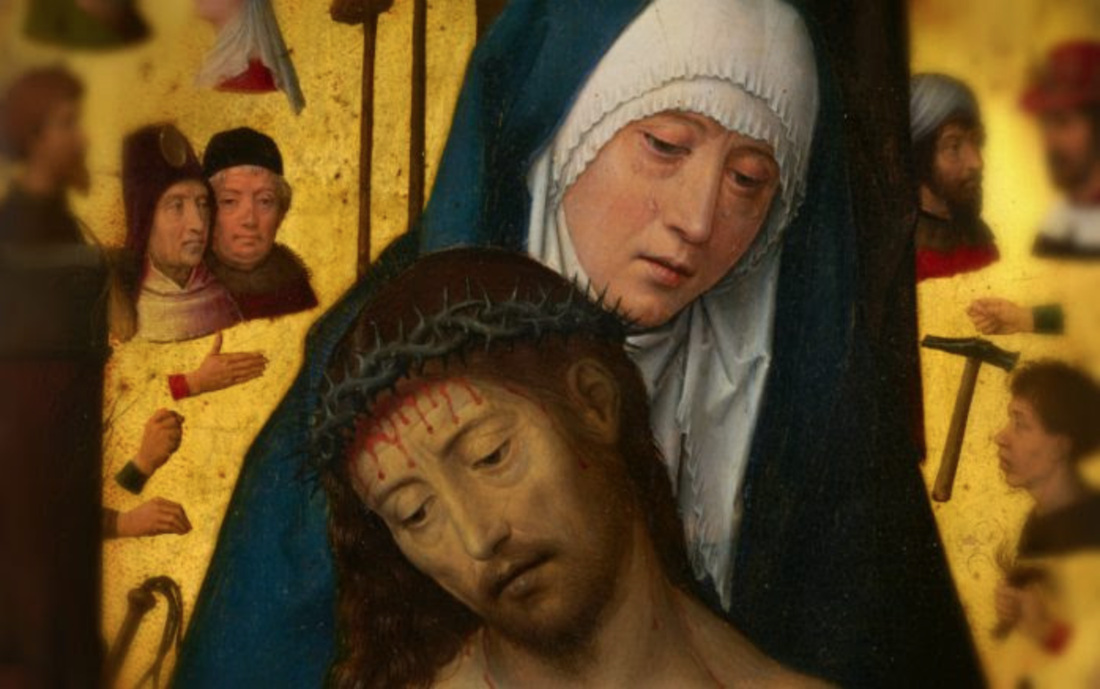In this e-weekly:
- The Rosary Foundation (Catholic Website of the Week)
- How the 'Bible in a Year' Podcast Changed the World (Diocesan News and BEYOND)
- Helpful Hints Submitted by Wives--Husbands Please Read (Helpful Hints for Life)
- The Rosary Foundation (Catholic Website of the Week)
- How the 'Bible in a Year' Podcast Changed the World (Diocesan News and BEYOND)
- Helpful Hints Submitted by Wives--Husbands Please Read (Helpful Hints for Life)
Catholic Good News
Receiving the Gospel, Serving God and Neighbor
PRAYER, Fasting, and Almsgiving
“Therefore I tell you, whatever you ask for in prayer,
believe that you have received it, and it will be yours.”
(Mark 11:24)
Receiving the Gospel, Serving God and Neighbor
PRAYER, Fasting, and Almsgiving
“Therefore I tell you, whatever you ask for in prayer,
believe that you have received it, and it will be yours.”
(Mark 11:24)
Dear friends in Christ Jesus,
The three tools to truly change this Lent are prayer, fasting, and almsgiving. And, if there is one thing we can never do enough of, it is pray.
Prayer needs not be only time in church, on our knees, or at specific times. Prayer needs to become a way of life. We must strive to be constantly united to Jesus Christ in our way of living, that we “pray always.” How wonderful it would be if praying became as natural as breathing.
I was at a profession of a dear friend of mine some years ago, when she united herself formally to a Carmelite convent. She pointed out to me that some of the nuns that ‘never break prayer.’ Even if they talk to you or do some task they keep themselves fully united to their Lord in constant prayer, with heart and mind raised to Him. I soon experienced what she was pointing out to me as I spoke with one of the Carmelites.
While the average Catholic is not called to this specifically, you and I are called to strive to pray constantly by uniting whatever we think, say, or do to Jesus Christ, the REAL person who loves us more than others do and more than we love ourselves. That is the challenge and joy of the Good News!
Peace and prayers in Jesus through Mary, loved by Saint Joseph,
Father Robert
P.S. This coming Sunday is the First Sunday of Lent. The readings can be found at: https://bible.usccb.org/bible/readings/022623.cfm
The three tools to truly change this Lent are prayer, fasting, and almsgiving. And, if there is one thing we can never do enough of, it is pray.
Prayer needs not be only time in church, on our knees, or at specific times. Prayer needs to become a way of life. We must strive to be constantly united to Jesus Christ in our way of living, that we “pray always.” How wonderful it would be if praying became as natural as breathing.
I was at a profession of a dear friend of mine some years ago, when she united herself formally to a Carmelite convent. She pointed out to me that some of the nuns that ‘never break prayer.’ Even if they talk to you or do some task they keep themselves fully united to their Lord in constant prayer, with heart and mind raised to Him. I soon experienced what she was pointing out to me as I spoke with one of the Carmelites.
While the average Catholic is not called to this specifically, you and I are called to strive to pray constantly by uniting whatever we think, say, or do to Jesus Christ, the REAL person who loves us more than others do and more than we love ourselves. That is the challenge and joy of the Good News!
Peace and prayers in Jesus through Mary, loved by Saint Joseph,
Father Robert
P.S. This coming Sunday is the First Sunday of Lent. The readings can be found at: https://bible.usccb.org/bible/readings/022623.cfm
Readings and reflections at end of e-mail.
Catholic Term of the Week
prayer (from Latin precaria, “obtain by pleading or earnestly requesting”)
- the elevation of the mind and heart to God (in praise of his glory; a petition made to God for some desired good, or in thanksgiving for a good received, or in intercession for others before God)
- the elevation of the mind and heart to God (in praise of his glory; a petition made to God for some desired good, or in thanksgiving for a good received, or in intercession for others before God)
“Helpful Hints of Life”
Helpful Hints Submitted by Wives
(Husbands, please take a look)
(Husbands, please take a look)
Not listed in any particular order
1) Be my best friend.
2) I need to know you call my name in your prayers
3) Hold me when I cry
4) Show and tell me that you love me often, and leave no doubt about it in my mind.
5) Show me your approval when I make a decision that is good.
6) Talk to me about what's important to you and to me.
7) Listen to me and don't treat me like I am stupid and don't know anything.
8) I need intimacy, and not just sexually. Anyone can have relations, but it takes a REAL man to be intimate.
9) Make me feel wanted and trusted in the things I can do for you.
10) Don't try to make me like your mother.
11) Remember that I am your "Help Mate". I am not someone to be stomped on and just used for your "whims".
12) Understand that I like to have our family near and want all relationships to be what God intended.
13) Comfort and hold me.
14) Be a one woman man.
15) Take the spiritual lead in giving me (and our children) direction and guidance.
16) Ask me for my help - it is good to be regarded as a helper and useful.
17) Make appropriate adjustments to your lifestyle and preferences as a married / family man.
18) Treat me with love and respect in the company of others.
19) Show appreciation and affirmation.
20) Tell me you love me often, even if you think I should already know this.
21) Show affection for no "reason" at all.
22) Make me feel as though I am still desirable.
23) Be devoted to caring, giving protection, and affirming your love.
24) Encourage me to realize my goals, and don't put me down for trying something new. Try to understand how I feel and listen to me when I try to tell you something that is important to us or that is hurting us.
“Prayer is both a gift of grace and a determined response on our part. It always presupposes effort. The great figures of prayer of the Old Covenant before Christ, as well as the Mother of God, the saints, and he himself, all teach us this: prayer is a battle. Against whom? Against ourselves and against the wiles of the tempter who does all he can to turn man away from prayer, away from union with God. We pray as we live, because we live as we pray. If we do not want to act habitually according to the Spirit of Christ, neither can we pray habitually in his name. The "spiritual battle" of the Christian's new life is inseparable from the battle of prayer.”
Catechism of the Catholic Church #2725
The Rosary Foundation is a charitable organization that is dedicated to promoting the benefits gained through recitation of the rosary. Its mission is to enlighten the world about the special graces available to all those who pray the rosary.
The Rosary Foundation organizes and manages several Rosary Awareness campaigns in an effort to promote the use of the rosary. Its members promote the rosary through search engine marketing and online media advertising; they promote prayer offline via word-of-mouth; they also promote prayer for several nonprofit charity organizations.
The Rosary Foundation organizes and manages several Rosary Awareness campaigns in an effort to promote the use of the rosary. Its members promote the rosary through search engine marketing and online media advertising; they promote prayer offline via word-of-mouth; they also promote prayer for several nonprofit charity organizations.
How "The Bible in a Year" Podcast Changed the World
Father Mike Schmitz is the host of the podcast "the Bible in a Year," produced by Ascension. / Courtesy of Ascension
On January 1, 2021, the Bible in a Year Podcast published its first episode.
The format was simple. Every day, listeners would hear a few, preselected excerpts from the Bible. Then the host, Father Mike Schmitz, offers a prayer and a short reflection on them. The average length of an episode is about twenty minutes.
In hindsight, it seems like a no-brainer that it would be popular. But at the time, no one really expected the podcast to be such an immediate hit. Within days, it jumped to the top of the charts, surpassing in popularity podcasts from The New York Times, National Public Radio, and other massively established mainstream organizations.
And that success continued. Although the podcast relinquished its top spot by January 18, 2021, it was back on top by the beginning of January 2022.
By the end of last year, the podcast had over 142 million downloads, which equated to about 3.3 billion minutes of listening worldwide.
This week on the CNA Newsroom podcast, we’ll bring you just a tiny sampling of the thousands of lives touched by God’s word, thanks to the Bible in a Year.
The format was simple. Every day, listeners would hear a few, preselected excerpts from the Bible. Then the host, Father Mike Schmitz, offers a prayer and a short reflection on them. The average length of an episode is about twenty minutes.
In hindsight, it seems like a no-brainer that it would be popular. But at the time, no one really expected the podcast to be such an immediate hit. Within days, it jumped to the top of the charts, surpassing in popularity podcasts from The New York Times, National Public Radio, and other massively established mainstream organizations.
And that success continued. Although the podcast relinquished its top spot by January 18, 2021, it was back on top by the beginning of January 2022.
By the end of last year, the podcast had over 142 million downloads, which equated to about 3.3 billion minutes of listening worldwide.
This week on the CNA Newsroom podcast, we’ll bring you just a tiny sampling of the thousands of lives touched by God’s word, thanks to the Bible in a Year.
The Spiritual Power of Our Lady’s Apparitions: How Mary’s Messages Can Guide You This Lent
by Fr. Edward Looney -
Wikimedia Commons, Public Domain / ChurchPOP
Throughout Lent, many people deepen their prayer life with spiritual practices and devotions.
Some choose to pray the rosary daily. Others pray the Stations of the Cross. Some might even sing the Stabat Mater along the way.
Mary is an excellent companion during the Lenten season, especially her messages and apparitions.
Prayer, penance, and almsgiving are the three pillars of the Lenten season. In Our Lady’s approved apparitions, she directs us to these pillars and encourages us to live them.
In the village of Beauraing in Belgium, Our Lady appeared to five children. She told the children to “pray, pray very much, pray always.”
In other apparitions, Our Lady told the seers for what or who they should pray.
In Fatima, she requested they pray the rosary for peace in the world. In Champion, Wisconsin, she requested they offer their holy communion for the conversion of sinners.
Not only did Our Lady tell us who or what to pray for, she requested different methods of prayer. Mary encourages us to become more prayerful, as well as intercessors for others.
Our Lenten observance also emphasizes penance. Our Lady also requested this in her apparitions.To St. Bernadette in Lourdes she said, “penance, penance, penance.”
At Fatima, she told the three children to offer their small sacrifices out of love for God and the Immaculate in reparation for sin and the conversion of sinners.
We fast and make acts of self-denial throughout Lent. Be sure to offer these sacrifices to God as a prayer. As you do so, Mary will accompany you on your Lenten journey, for she encouraged us to do penances.
The third element of Lent is almsgiving in our care and support for the poor.In Mary’s Magnificat, she prays that God “casts down the mighty from their thrones and lifts up the lowly.” Mary has a special place in her prayer and heart for the poor.
The visionaries in Our Lady’s apparitions came from poor families. St. Bernadette’s family was incredibly poor. In Lourdes, the sick and those poor in health come and pray for healing.
In 1933 when Mary appeared to Mariette Beco in Banneux, Belgium, she told the child she was the “Virgin of the Poor.”
During this season of almsgiving, we journey with a woman who identifies with the poor, and allow those who are poor financially, physically, spiritually, or emotionally, to turn to her motherly intercession.
Throughout your Lenten journey, consider doing so in prayer with the Blessed Virgin. And if you’d like, listen to Mary’s words from her approved apparitions and allow them to guide your life, not only during Lent, but for the rest of your life.
Some choose to pray the rosary daily. Others pray the Stations of the Cross. Some might even sing the Stabat Mater along the way.
Mary is an excellent companion during the Lenten season, especially her messages and apparitions.
Prayer, penance, and almsgiving are the three pillars of the Lenten season. In Our Lady’s approved apparitions, she directs us to these pillars and encourages us to live them.
In the village of Beauraing in Belgium, Our Lady appeared to five children. She told the children to “pray, pray very much, pray always.”
In other apparitions, Our Lady told the seers for what or who they should pray.
In Fatima, she requested they pray the rosary for peace in the world. In Champion, Wisconsin, she requested they offer their holy communion for the conversion of sinners.
Not only did Our Lady tell us who or what to pray for, she requested different methods of prayer. Mary encourages us to become more prayerful, as well as intercessors for others.
Our Lenten observance also emphasizes penance. Our Lady also requested this in her apparitions.To St. Bernadette in Lourdes she said, “penance, penance, penance.”
At Fatima, she told the three children to offer their small sacrifices out of love for God and the Immaculate in reparation for sin and the conversion of sinners.
We fast and make acts of self-denial throughout Lent. Be sure to offer these sacrifices to God as a prayer. As you do so, Mary will accompany you on your Lenten journey, for she encouraged us to do penances.
The third element of Lent is almsgiving in our care and support for the poor.In Mary’s Magnificat, she prays that God “casts down the mighty from their thrones and lifts up the lowly.” Mary has a special place in her prayer and heart for the poor.
The visionaries in Our Lady’s apparitions came from poor families. St. Bernadette’s family was incredibly poor. In Lourdes, the sick and those poor in health come and pray for healing.
In 1933 when Mary appeared to Mariette Beco in Banneux, Belgium, she told the child she was the “Virgin of the Poor.”
During this season of almsgiving, we journey with a woman who identifies with the poor, and allow those who are poor financially, physically, spiritually, or emotionally, to turn to her motherly intercession.
Throughout your Lenten journey, consider doing so in prayer with the Blessed Virgin. And if you’d like, listen to Mary’s words from her approved apparitions and allow them to guide your life, not only during Lent, but for the rest of your life.
Madrid, Spain, Mar 6 (EWTN News/CNA) -After an anti-clerical childhood and adolescence, filled with hatred for the Church, Fr. Juan José Martínez says he discovered “that God exists and wants me as his priest.”
“Sunday mornings I would peer out of the balcony of my house, and when the people were going by on their way to Mass, I would spit on them. I told them that the Church was a sect that wanted their money,” explained the priest, who ministers in the Diocese of Almeria, Spain.
Fr. Juan José's parents were not believers, and he had received no religious formation, but he said they did not raise him to be intolerant. In fact, he says he does not know where he got all those ideas, because the perception he had of the Church and God was that of a “multinational corporation with branches in every neighborhood to extract money, like a sect.”
“I was absolutely anticlerical, I was the first student in my school and the town of Carboneras, Almeria Province, to never be taught Religion because when I was 8 or 9, I chose the alternative course which was Ethics. In the following years, I went on convincing my friends to quit Religion classes and to take Ethics with me. In the end, my whole class ended up being taught Ethics and none of them Religion.”
But what he never imagined is that the end of his journey would be to help his friends to come back to the Church. Fr. Juan José remembers quite well that the first day he went into a Catholic church, “I went to make fun of those who had invited me.”
“It was in January 1995, some friends from class invited me to a Catholic Charismatic Renewal prayer group at the parish. Obviously I told them I wasn't planning on going because I didn't want them to brainwash me. For a whole month they persisted. I finally gave in – it was a Thursday in February 1995 when I went into a Catholic church for the first time.”
A golden box
A lot of his friends were there, and he was surprised because “they were all looking at a golden box at the back of the church. I didn't know what it was, but I thought it was where the parish priest kept the money.”
That golden box was the Tabernacle.
Fr. Juan José says that he came to make fun of them because “I thought they were crazy. Inside, I was laughing at them a lot, but I was polite and concealed it. But I decided to come back the following Thursday to laugh at them some more.”
And so one Thursday after another, Fr. Juan José was letting go of his prejudices against the Church and religion.
“The pastor seemed to me to be a very wise man who was helping the people,” he told CNA. And little by little, the love of God was penetrating his heart: “I was 15 years old and I started to sing at Mass, which meant I would attend Mass on Saturdays. I liked being in front of the tabernacle and little by little, I realized that God existed and loved me. I felt the love of God. The Charismatic Renewal group, which I had come to make fun of, helped me a lot.”
“My eyes were being opened and I saw that God was not a legend or story for the weak, but that he existed and that he was supporting and guiding me. I experienced that he loved me so much that he wanted me for himself and was calling me,” he recalled.
“I am yours for whatever you need”
Fr. Juan José had been baptized and made his First Communion because of his grandparents' wishes, but he did not have a relationship with God after that. “I made my Confirmation as I was right in the midst of the process of conversion, and it was a genuine gift. That day I told the Lord, 'I am yours for whatever you need.' My mother came but my father did not. It was a unique moment in my life to receive the Holy Spirit and to put my trust in the Lord.”
For months, the young Juan José was resisting the call to the priesthood. “I told the Lord that I didn't want any hassles and to quit talking to me. Until I had to make a decision and it was to follow him, becoming a priest.”
One Saturday afternoon when he was 17, Fr. Juan José told his father he wanted to go to the seminary. His father beat him and said that “he would be a priest over his dead body.”
“They did not understand that I would want to be a priest. In fact, my father offered to pay for me to go to college in the United States but (he told me) he would never pay for the seminary.”
In such a difficult moment, Fr. Juan José recalled that all he could think of was the prayer of Saint Teresa of Avila: “Let nothing disturb you, nothing frighten you. All you need is God” and when his father stopped rebuking him, the young man gave him a hug and said to him, “I knew you were going to react like that, but I also knew that one day you'd understand.”
“Welcome”
In fact, his father went so far as to threaten to report the pastor to the police if kept helping his son discern his vocation. “My father was trying everything, but the Lord is stronger,” he said.
To obey his father, Fr. Juan José could not start the seminary, and so he began to study teaching at the University of Almeria. For years he was patient, and continued to be faithful to his vocation to the priesthood. Until one day in May 1999, as he recalled, his mother told him that she had spoken to his father and that finally he would let him enter the seminary. “I began to cry and cry. I remember when I told the pastor about it he said “welcome” and gave me a great big hug.”
In September 2000, he finally entered the seminary.
In 2006, Fr.Juan José was ordained in the Almeria cathedral and his father even attended the ceremony. “In no way did he want me to become a priest, but he saw that I was happy and even though he was totally anticlerical, he decided that the happiness of his son came before his ideology and if I was happy, even though he didn't understand it, he would have to accept it. “
In fact, he recalled that two years ago, “before dying, my father received the Anointing of the Sick. And it was I who administered it to him.”
“When somebody tells me he doesn't believe in God, I always tell him that neither did I believe in Him, but I was mistaken, because I have discovered the genuine happiness that Jesus has given to me. If you're not completely happy, ask the Lord to help you, because only He will give you the happiness that your heart needs.”
“Sunday mornings I would peer out of the balcony of my house, and when the people were going by on their way to Mass, I would spit on them. I told them that the Church was a sect that wanted their money,” explained the priest, who ministers in the Diocese of Almeria, Spain.
Fr. Juan José's parents were not believers, and he had received no religious formation, but he said they did not raise him to be intolerant. In fact, he says he does not know where he got all those ideas, because the perception he had of the Church and God was that of a “multinational corporation with branches in every neighborhood to extract money, like a sect.”
“I was absolutely anticlerical, I was the first student in my school and the town of Carboneras, Almeria Province, to never be taught Religion because when I was 8 or 9, I chose the alternative course which was Ethics. In the following years, I went on convincing my friends to quit Religion classes and to take Ethics with me. In the end, my whole class ended up being taught Ethics and none of them Religion.”
But what he never imagined is that the end of his journey would be to help his friends to come back to the Church. Fr. Juan José remembers quite well that the first day he went into a Catholic church, “I went to make fun of those who had invited me.”
“It was in January 1995, some friends from class invited me to a Catholic Charismatic Renewal prayer group at the parish. Obviously I told them I wasn't planning on going because I didn't want them to brainwash me. For a whole month they persisted. I finally gave in – it was a Thursday in February 1995 when I went into a Catholic church for the first time.”
A golden box
A lot of his friends were there, and he was surprised because “they were all looking at a golden box at the back of the church. I didn't know what it was, but I thought it was where the parish priest kept the money.”
That golden box was the Tabernacle.
Fr. Juan José says that he came to make fun of them because “I thought they were crazy. Inside, I was laughing at them a lot, but I was polite and concealed it. But I decided to come back the following Thursday to laugh at them some more.”
And so one Thursday after another, Fr. Juan José was letting go of his prejudices against the Church and religion.
“The pastor seemed to me to be a very wise man who was helping the people,” he told CNA. And little by little, the love of God was penetrating his heart: “I was 15 years old and I started to sing at Mass, which meant I would attend Mass on Saturdays. I liked being in front of the tabernacle and little by little, I realized that God existed and loved me. I felt the love of God. The Charismatic Renewal group, which I had come to make fun of, helped me a lot.”
“My eyes were being opened and I saw that God was not a legend or story for the weak, but that he existed and that he was supporting and guiding me. I experienced that he loved me so much that he wanted me for himself and was calling me,” he recalled.
“I am yours for whatever you need”
Fr. Juan José had been baptized and made his First Communion because of his grandparents' wishes, but he did not have a relationship with God after that. “I made my Confirmation as I was right in the midst of the process of conversion, and it was a genuine gift. That day I told the Lord, 'I am yours for whatever you need.' My mother came but my father did not. It was a unique moment in my life to receive the Holy Spirit and to put my trust in the Lord.”
For months, the young Juan José was resisting the call to the priesthood. “I told the Lord that I didn't want any hassles and to quit talking to me. Until I had to make a decision and it was to follow him, becoming a priest.”
One Saturday afternoon when he was 17, Fr. Juan José told his father he wanted to go to the seminary. His father beat him and said that “he would be a priest over his dead body.”
“They did not understand that I would want to be a priest. In fact, my father offered to pay for me to go to college in the United States but (he told me) he would never pay for the seminary.”
In such a difficult moment, Fr. Juan José recalled that all he could think of was the prayer of Saint Teresa of Avila: “Let nothing disturb you, nothing frighten you. All you need is God” and when his father stopped rebuking him, the young man gave him a hug and said to him, “I knew you were going to react like that, but I also knew that one day you'd understand.”
“Welcome”
In fact, his father went so far as to threaten to report the pastor to the police if kept helping his son discern his vocation. “My father was trying everything, but the Lord is stronger,” he said.
To obey his father, Fr. Juan José could not start the seminary, and so he began to study teaching at the University of Almeria. For years he was patient, and continued to be faithful to his vocation to the priesthood. Until one day in May 1999, as he recalled, his mother told him that she had spoken to his father and that finally he would let him enter the seminary. “I began to cry and cry. I remember when I told the pastor about it he said “welcome” and gave me a great big hug.”
In September 2000, he finally entered the seminary.
In 2006, Fr.Juan José was ordained in the Almeria cathedral and his father even attended the ceremony. “In no way did he want me to become a priest, but he saw that I was happy and even though he was totally anticlerical, he decided that the happiness of his son came before his ideology and if I was happy, even though he didn't understand it, he would have to accept it. “
In fact, he recalled that two years ago, “before dying, my father received the Anointing of the Sick. And it was I who administered it to him.”
“When somebody tells me he doesn't believe in God, I always tell him that neither did I believe in Him, but I was mistaken, because I have discovered the genuine happiness that Jesus has given to me. If you're not completely happy, ask the Lord to help you, because only He will give you the happiness that your heart needs.”
(Vatican City, Feb 17 (EWTN News/CNA) - As homeless men and women line up under the massive arms of Saint Peter's colonnade waiting to take advantage of the Vatican's newly-christened showers and barbershop, volunteers who assist them say they are deeply moved by their encounter with a population often rejected by society.
“Initially when they offered me this (job) I thought I would find myself confronted with grouchy, perhaps mean people,” said volunteer barber Danielle Mancuso.
“Instead, I discovered a truly tremendous humanity.”
“You see these poor people out in the middle of the street, discarded. Then, you speak to them, and they're human,” he said, recounting his first day.
Officially inaugurated on Feb. 16, the facilities provide the opportunity for homeless individuals to have their hair cut each Monday – a day when barber shops in Italy are traditionally closed – by volunteer barbers. Meanwhile, the shower services will be offered daily, with the exception of Wednesday due to the large crowds which attend the weekly general audience.
“I cut my hair, took a shower, beard, everything. It's wonderful!” 51-year-old Gregorio from Poland, who's been living in Rome for 13 years, told EWTN News.
Construction began in November on new showers and bathrooms under the colonnades of St. Peter’s Square.
Many barbers have volunteered with enthusiasm, including two barbers from the national Italian organization that transports the sick to Lourdes, France and other international shrines (UNITALSI). Other volunteers are finishing their final year in barber school.
“It's been a great lesson for me,” said Andrea Valeriano, an UNITALSI volunteer. “Everyone has waited (their turn) calmly. And I've seen a lot solidarity among them.”
Papal almoner Archbishop Konrad Krajewski spearheaded the reconstruction of St. Peter's square bathrooms to include the shower and barbershop facilities, which have witnessed a substantial response since their opening.
The Polish bishop is charged with the dual responsibility of carrying out acts of charity for the poor and raising the money to fund them. When the archbishop was appointed, Pope Francis urged him not to stay at his desk but rather to be an active worker for the benefit of the poor.
Vatican Insider reported that Archbishop Krajewski received his inspiration for the showers after taking a homeless man to dinner in order to celebrate his birthday. The man, who turned 50, told the archbishop that finding food in the city is easy, but staying clean was not.
“Prayer to Jesus is answered by him already during his ministry, through signs that anticipate the power of his death and Resurrection: Jesus hears the prayer of faith, expressed in words (the leper, Jairus, the Canaanite woman, the good thief) or in silence (the bearers of the paralytic, the woman with a hemorrhage who touches his clothes, the tears and ointment of the sinful woman). The urgent request of the blind men, "Have mercy on us, Son of David" or "Jesus, Son of David, have mercy on me!" has-been renewed in the traditional prayer to Jesus known as the Jesus Prayer: "Lord Jesus Christ, Son of God, have mercy on me, a sinner!" Healing infirmities or forgiving sins, Jesus always responds to a prayer offered in faith: "Your faith has made you well; go in peace."
St. Augustine wonderfully summarizes the three dimensions of Jesus' prayer: "He prays for us as our priest, prays in us as our Head, and is prayed to by us as our God. Therefore let us acknowledge our voice in him and his in us."
Catechism of the Catholic Church #2616
“Initially when they offered me this (job) I thought I would find myself confronted with grouchy, perhaps mean people,” said volunteer barber Danielle Mancuso.
“Instead, I discovered a truly tremendous humanity.”
“You see these poor people out in the middle of the street, discarded. Then, you speak to them, and they're human,” he said, recounting his first day.
Officially inaugurated on Feb. 16, the facilities provide the opportunity for homeless individuals to have their hair cut each Monday – a day when barber shops in Italy are traditionally closed – by volunteer barbers. Meanwhile, the shower services will be offered daily, with the exception of Wednesday due to the large crowds which attend the weekly general audience.
“I cut my hair, took a shower, beard, everything. It's wonderful!” 51-year-old Gregorio from Poland, who's been living in Rome for 13 years, told EWTN News.
Construction began in November on new showers and bathrooms under the colonnades of St. Peter’s Square.
Many barbers have volunteered with enthusiasm, including two barbers from the national Italian organization that transports the sick to Lourdes, France and other international shrines (UNITALSI). Other volunteers are finishing their final year in barber school.
“It's been a great lesson for me,” said Andrea Valeriano, an UNITALSI volunteer. “Everyone has waited (their turn) calmly. And I've seen a lot solidarity among them.”
Papal almoner Archbishop Konrad Krajewski spearheaded the reconstruction of St. Peter's square bathrooms to include the shower and barbershop facilities, which have witnessed a substantial response since their opening.
The Polish bishop is charged with the dual responsibility of carrying out acts of charity for the poor and raising the money to fund them. When the archbishop was appointed, Pope Francis urged him not to stay at his desk but rather to be an active worker for the benefit of the poor.
Vatican Insider reported that Archbishop Krajewski received his inspiration for the showers after taking a homeless man to dinner in order to celebrate his birthday. The man, who turned 50, told the archbishop that finding food in the city is easy, but staying clean was not.
“Prayer to Jesus is answered by him already during his ministry, through signs that anticipate the power of his death and Resurrection: Jesus hears the prayer of faith, expressed in words (the leper, Jairus, the Canaanite woman, the good thief) or in silence (the bearers of the paralytic, the woman with a hemorrhage who touches his clothes, the tears and ointment of the sinful woman). The urgent request of the blind men, "Have mercy on us, Son of David" or "Jesus, Son of David, have mercy on me!" has-been renewed in the traditional prayer to Jesus known as the Jesus Prayer: "Lord Jesus Christ, Son of God, have mercy on me, a sinner!" Healing infirmities or forgiving sins, Jesus always responds to a prayer offered in faith: "Your faith has made you well; go in peace."
St. Augustine wonderfully summarizes the three dimensions of Jesus' prayer: "He prays for us as our priest, prays in us as our Head, and is prayed to by us as our God. Therefore let us acknowledge our voice in him and his in us."
Catechism of the Catholic Church #2616
A bit of humor…
-I saw an ad for burial plots, and thought to myself this is the last thing I need.
-Just burned 2,000 calories. That's the last time I leave brownies in the oven while I nap.
-I'm great at multitasking. I can waste time, be unproductive, and procrastinate all at once.
For My Next Impression…I’m now in high school, so when I ran into my third-grade teacher, I doubted she would remember me.
“Hi, Miss Jones,” I said.
“Hi, Eddie,” she replied.
“So you do remember me?” I asked.
“Sure. You don’t always leave a good impression, but it is a lasting one.”
They Still Fit
I don’t want to brag or make anybody jealous or anything, but I can still fit into the earrings I wore in high school.
Drunk Driving
A man is driving down to New York to see a show, and he's stopped in Connecticut for speeding. The state trooper smells alcohol on his breath, sees an empty wine bottle on the floor, and asks, "Sir, have you been drinking?"
The man replies, "Just water."
The trooper asks, "Then, why do I smell wine?"
The man looks down at the bottle and exclaims, "Good Lord, Jesus has done it again, just like at the Wedding Feast of Cana!"
-------------------------------------------------------------------------
After a church service on Sunday morning, a young boy suddenly announced to his mother,
"Mom, I've decided to become a minister when I grow up."
"That's okay with us, but what made you decide that?"
"Well," said the little boy, "I have to go to church on Sunday anyway,
And I figure it will be more fun to stand up and yell, than to sit and listen."
The Sunday School Teacher asks,
"Now, Johnny, tell me frankly do you say prayers before eating?"
"No ma'am," little Johnny replies, I don't have to.
My mom is a good cook."
-I saw an ad for burial plots, and thought to myself this is the last thing I need.
-Just burned 2,000 calories. That's the last time I leave brownies in the oven while I nap.
-I'm great at multitasking. I can waste time, be unproductive, and procrastinate all at once.
For My Next Impression…I’m now in high school, so when I ran into my third-grade teacher, I doubted she would remember me.
“Hi, Miss Jones,” I said.
“Hi, Eddie,” she replied.
“So you do remember me?” I asked.
“Sure. You don’t always leave a good impression, but it is a lasting one.”
They Still Fit
I don’t want to brag or make anybody jealous or anything, but I can still fit into the earrings I wore in high school.
Drunk Driving
A man is driving down to New York to see a show, and he's stopped in Connecticut for speeding. The state trooper smells alcohol on his breath, sees an empty wine bottle on the floor, and asks, "Sir, have you been drinking?"
The man replies, "Just water."
The trooper asks, "Then, why do I smell wine?"
The man looks down at the bottle and exclaims, "Good Lord, Jesus has done it again, just like at the Wedding Feast of Cana!"
-------------------------------------------------------------------------
After a church service on Sunday morning, a young boy suddenly announced to his mother,
"Mom, I've decided to become a minister when I grow up."
"That's okay with us, but what made you decide that?"
"Well," said the little boy, "I have to go to church on Sunday anyway,
And I figure it will be more fun to stand up and yell, than to sit and listen."
The Sunday School Teacher asks,
"Now, Johnny, tell me frankly do you say prayers before eating?"
"No ma'am," little Johnny replies, I don't have to.
My mom is a good cook."
The Morning Offering
O Jesus, through the Immaculate Heart of Mary, I offer You my prayers, works, joys and sufferings of this day for all the intentions of Your Sacred Heart, in union with the Holy Sacrifice of the Mass throughout the world, in reparation for my sins, for the intentions of all my relatives and friends, and in particular for the intentions of the Holy Father. Amen.
O Jesus, through the Immaculate Heart of Mary, I offer You my prayers, works, joys and sufferings of this day for all the intentions of Your Sacred Heart, in union with the Holy Sacrifice of the Mass throughout the world, in reparation for my sins, for the intentions of all my relatives and friends, and in particular for the intentions of the Holy Father. Amen.
“In the battle of prayer, we must face in ourselves and around us erroneous notions of prayer. Some people view prayer as a simple psychological activity, others as an effort of concentration to reach a mental void. Still others reduce prayer to ritual words and postures. Many Christians unconsciously regard prayer as an occupation that is incompatible with all the other things they have to do: they "don't have the time." Those who seek God by prayer are quickly discouraged because they do not know that prayer comes also from the Holy Spirit and not from themselves alone.” -Catechism of the Catholic Church #2726
+JMJ+
SUNDAY MASS READINGS AND QUESTIONS
for Self-Reflection, Couples or Family Discussion
First Sunday in Lent - Sunday, February 26th , 2023
The First Reading - Genesis 2:7-9, 3:1-7
The LORD God formed man out of the clay of the ground and blew into his nostrils the breath of life, and so man became a living being. Then the LORD God planted a garden in Eden, in the east, and placed there the man whom he had formed. Out of the ground the LORD God made various trees grow that were delightful to look at and good for food, with the tree of life in the middle of the garden and the tree of the knowledge of good and evil. Now the serpent was the most cunning of all the animals that the LORD God had made. The serpent asked the woman, “Did God really tell you not to eat from any of the trees in the garden?” The woman answered the serpent: “We may eat of the fruit of the trees in the garden; it is only about the fruit of the tree in the middle of the garden that God said, ‘You shall not eat it or even touch it, lest you die.’” But the serpent said to the woman: “You certainly will not die! No, God knows well that the moment you eat of it your eyes will be opened and you will be like gods who know what is good and what is evil.” The woman saw that the tree was good for food, pleasing to the eyes, and desirable for gaining wisdom. So she took some of its fruit and ate it; and she also gave some to her husband, who was with her, and he ate it. Then the eyes of both of them were opened, and they realized that they were naked; so they sewed fig leaves together and made loincloths for themselves.
Reflection
In the Christian tradition, this threefold love of the world—Lust of the Flesh, Lust of the Eyes, and Pride of Life—is known as the threefold concupiscence, and lines up roughly with the sins of (physical) lust, avarice (greed), and pride.
We see this threefold pattern at work when Eve gives in to temptation: The woman saw that the tree was (1) good for food, (2) pleasing to the eyes, and (3) desirable for gaining wisdom. “Good for food”—this is physical lust. “Pleasing to the eye”—this is avarice, the desire to have more, to possess things for their beauty or value. “Desirable for gaining wisdom”—this is pride, because the purpose for gaining wisdom is to make herself equal to God. As the serpent says, “You will be like God” (RSV). Although Eve is the one tempted into sin according to the narrative, the biblical and post-biblical tradition often attributes the Fall just as much, or even primarily, to Adam, probably because he was considered “head of the family,” and was also the guardian of the garden who should have kept the serpent out in the first place.
Adults - Which of the categories of concupiscence do you struggle with the most?
Teens -What was Adam’s failure?
Kids - Is there a sin you need to work on stopping during Lent?
Responsorial- Psalm 51: 3-4, 5-6, 12-13, 17
R.Be merciful, O Lord, for we have sinned.
Have mercy on me, O God, in your goodness;
in the greatness of your compassion wipe out my offense.
Thoroughly wash me from my guilt
and of my sin cleanse me.
R. Be merciful, O Lord, for we have sinned.
For I acknowledge my offense,
and my sin is before me always:
“Against you only have I sinned,
and done what is evil in your sight.”
R. Be merciful, O Lord, for we have sinned.
A clean heart create for me, O God,
and a steadfast spirit renew within me.
Cast me not out from your presence,
and your Holy Spirit take not from me.
R. Be merciful, O Lord, for we have sinned.
Give me back the joy of your salvation,
and a willing spirit sustain in me.
O Lord, open my lips,
and my mouth shall proclaim your praise.
R. Be merciful, O Lord, for we have sinned.
Reflection
-The Responsorial Psalm is Psalm 51, the most famous psalm of penitence in the psalter, written by David after his sin with Bathsheba. What is an example you have see of God’s mercy at work?
The Second Reading- Romans 5:12-19
Brothers and sisters: Through one man sin entered the world, and through sin, death, and thus death came to all men, inasmuch as all sinned— for up to the time of the law, sin was in the world, though sin is not accounted when there is no law. But death reigned from Adam to Moses, even over those who did not sin after the pattern of the trespass of Adam, who is the type of the one who was to come. But the gift is not like the transgression. For if by the transgression of the one, the many died, how much more did the grace of God and the gracious gift of the one man Jesus Christ overflow for the many. And the gift is not like the result of the one who sinned. For after one sin there was the judgment that brought condemnation; but the gift, after many transgressions, brought acquittal. For if, by the transgression of the one, death came to reign through that one, how much more will those who receive the abundance of grace and of the gift of justification come to reign in life through the one Jesus Christ. In conclusion, just as through one transgression condemnation came upon all, so, through one righteous act, acquittal and life came to all. For just as through the disobedience of the one man the many were made sinners, so, through the obedience of the one, the many will be made righteous.
Reflection - This passage illustrates what was said above about Adam being attributed primary responsibility in the Fall. Be that as it may, the Church is calling our attention to the parallel between the Fall and Christ’s victory over temptation. St. Paul’s words in this passage remind us of how dependent we are on Christ for our Lenten observances to have any spiritual effect. By themselves, practices like fasting and almsgiving do not necessarily affect our souls. There are plenty of people, for example, who have experienced hunger and yet have remained bitter or selfish; likewise many have given away money, or had it taken away, without experiencing spiritual transformation. Our Lenten efforts are not effective by themselves. They are only effective when we unite our small, token efforts with the work of Jesus. His redemption infuses our humble efforts with meaning, value, and effectiveness. -What does it mean that our suffering has value?
The Holy Gospel according to Matthew 4:1-11
At that time Jesus was led by the Spirit into the desert to be tempted by the devil. He fasted for forty days and forty nights, and afterwards he was hungry. The tempter approached and said to him, “If you are the Son of God, command that these stones become loaves of bread.” He said in reply, “It is written: One does not live on bread alone, but on every word that comes forth from the mouth of God.” Then the devil took him to the holy city, and made him stand on the parapet of the temple, and said to him, “If you are the Son of God, throw yourself down. For it is written: He will command his angels concerning you and with their hands they will support you, lest you dash your foot against a stone.” Jesus answered him, “Again it is written, You shall not put the Lord, your God, to the test.” Then the devil took him up to a very high mountain, and showed him all the kingdoms of the world in their magnificence, and he said to him, "All these I shall give to you, if you will prostrate yourself and worship me.” At this, Jesus said to him, “Get away, Satan! It is written: The Lord, your God, shall you worship and him alone shall you serve.” Then the devil left him and, behold, angels came and ministered to him.
Reflection
The temptations follow the pattern of the threefold concupiscence mentioned above. In each of these cases, Jesus opposes the temptation by quoted from Scripture, specifically the Book of Deuteronomy. We as Christians are called to overcome, as Jesus did, the Lust of the Flesh, the Lust of the Eyes, and Pride. Our traditional Lenten disciplines (Prayer, Fasting, Almsgiving) are intended to help us in this. Fasting mortifies Lust of the Flesh. Almsgiving mortifies Lust of the Eyes (greed, avarice). And prayer mortifies Pride, by acknowledging our dependence on God (“give us our daily bread ...”; Matt 6:11) and submitting our will to His (“Thy will be done ...”; Matt 6:10). Let’s unite our efforts to Jesus powerful work of redemption by faith, and let his Spirit work in us this Lent through the means our Lenten disciplines.
Adults - How can your Lenten discipline work against the sin you struggle with?
Teens - How can your Lenten disciplines help you combat sin and grow closer to Christ?
Kids - What does it mean that God gives us our daily bread?
LIVING THE WORD OF GOD THIS WEEK! - Our basic temptations in life are the same: bodily comforts and pleasure, the empty esteem of our fellowman, wealth and power. There are millions of men and women on earth today—many of them nominal Christians—who have given in to these temptations and, are wasting their lives chasing after these unattainable shadows. But even should they manage to catch up with some of them, they soon find out that they are empty baubles. They will have to leave them so very soon. Today, let each one of us look into his heart and honestly examine his reaction to these temptations. Do we imitate our Savior and leader, and say "begone Satan"? Our purpose in life is not to collect its treasures, its honors or its pleasures. We are here for a few short years, to merit the unending life which Christ has won for us. Would we be so foolish as to swap our inheritance for a mere mess of pottage (see Gen. 25:29-34)? Lent is a golden opportunity to review our past and make sensible resolutions for our future. -Excerpted from The Sunday Readings by Fr. Kevin O'Sullivan, O.F.M.
+JMJ+
SUNDAY MASS READINGS AND QUESTIONS
for Self-Reflection, Couples or Family Discussion
First Sunday in Lent - Sunday, February 26th , 2023
The First Reading - Genesis 2:7-9, 3:1-7
The LORD God formed man out of the clay of the ground and blew into his nostrils the breath of life, and so man became a living being. Then the LORD God planted a garden in Eden, in the east, and placed there the man whom he had formed. Out of the ground the LORD God made various trees grow that were delightful to look at and good for food, with the tree of life in the middle of the garden and the tree of the knowledge of good and evil. Now the serpent was the most cunning of all the animals that the LORD God had made. The serpent asked the woman, “Did God really tell you not to eat from any of the trees in the garden?” The woman answered the serpent: “We may eat of the fruit of the trees in the garden; it is only about the fruit of the tree in the middle of the garden that God said, ‘You shall not eat it or even touch it, lest you die.’” But the serpent said to the woman: “You certainly will not die! No, God knows well that the moment you eat of it your eyes will be opened and you will be like gods who know what is good and what is evil.” The woman saw that the tree was good for food, pleasing to the eyes, and desirable for gaining wisdom. So she took some of its fruit and ate it; and she also gave some to her husband, who was with her, and he ate it. Then the eyes of both of them were opened, and they realized that they were naked; so they sewed fig leaves together and made loincloths for themselves.
Reflection
In the Christian tradition, this threefold love of the world—Lust of the Flesh, Lust of the Eyes, and Pride of Life—is known as the threefold concupiscence, and lines up roughly with the sins of (physical) lust, avarice (greed), and pride.
We see this threefold pattern at work when Eve gives in to temptation: The woman saw that the tree was (1) good for food, (2) pleasing to the eyes, and (3) desirable for gaining wisdom. “Good for food”—this is physical lust. “Pleasing to the eye”—this is avarice, the desire to have more, to possess things for their beauty or value. “Desirable for gaining wisdom”—this is pride, because the purpose for gaining wisdom is to make herself equal to God. As the serpent says, “You will be like God” (RSV). Although Eve is the one tempted into sin according to the narrative, the biblical and post-biblical tradition often attributes the Fall just as much, or even primarily, to Adam, probably because he was considered “head of the family,” and was also the guardian of the garden who should have kept the serpent out in the first place.
Adults - Which of the categories of concupiscence do you struggle with the most?
Teens -What was Adam’s failure?
Kids - Is there a sin you need to work on stopping during Lent?
Responsorial- Psalm 51: 3-4, 5-6, 12-13, 17
R.Be merciful, O Lord, for we have sinned.
Have mercy on me, O God, in your goodness;
in the greatness of your compassion wipe out my offense.
Thoroughly wash me from my guilt
and of my sin cleanse me.
R. Be merciful, O Lord, for we have sinned.
For I acknowledge my offense,
and my sin is before me always:
“Against you only have I sinned,
and done what is evil in your sight.”
R. Be merciful, O Lord, for we have sinned.
A clean heart create for me, O God,
and a steadfast spirit renew within me.
Cast me not out from your presence,
and your Holy Spirit take not from me.
R. Be merciful, O Lord, for we have sinned.
Give me back the joy of your salvation,
and a willing spirit sustain in me.
O Lord, open my lips,
and my mouth shall proclaim your praise.
R. Be merciful, O Lord, for we have sinned.
Reflection
-The Responsorial Psalm is Psalm 51, the most famous psalm of penitence in the psalter, written by David after his sin with Bathsheba. What is an example you have see of God’s mercy at work?
The Second Reading- Romans 5:12-19
Brothers and sisters: Through one man sin entered the world, and through sin, death, and thus death came to all men, inasmuch as all sinned— for up to the time of the law, sin was in the world, though sin is not accounted when there is no law. But death reigned from Adam to Moses, even over those who did not sin after the pattern of the trespass of Adam, who is the type of the one who was to come. But the gift is not like the transgression. For if by the transgression of the one, the many died, how much more did the grace of God and the gracious gift of the one man Jesus Christ overflow for the many. And the gift is not like the result of the one who sinned. For after one sin there was the judgment that brought condemnation; but the gift, after many transgressions, brought acquittal. For if, by the transgression of the one, death came to reign through that one, how much more will those who receive the abundance of grace and of the gift of justification come to reign in life through the one Jesus Christ. In conclusion, just as through one transgression condemnation came upon all, so, through one righteous act, acquittal and life came to all. For just as through the disobedience of the one man the many were made sinners, so, through the obedience of the one, the many will be made righteous.
Reflection - This passage illustrates what was said above about Adam being attributed primary responsibility in the Fall. Be that as it may, the Church is calling our attention to the parallel between the Fall and Christ’s victory over temptation. St. Paul’s words in this passage remind us of how dependent we are on Christ for our Lenten observances to have any spiritual effect. By themselves, practices like fasting and almsgiving do not necessarily affect our souls. There are plenty of people, for example, who have experienced hunger and yet have remained bitter or selfish; likewise many have given away money, or had it taken away, without experiencing spiritual transformation. Our Lenten efforts are not effective by themselves. They are only effective when we unite our small, token efforts with the work of Jesus. His redemption infuses our humble efforts with meaning, value, and effectiveness. -What does it mean that our suffering has value?
The Holy Gospel according to Matthew 4:1-11
At that time Jesus was led by the Spirit into the desert to be tempted by the devil. He fasted for forty days and forty nights, and afterwards he was hungry. The tempter approached and said to him, “If you are the Son of God, command that these stones become loaves of bread.” He said in reply, “It is written: One does not live on bread alone, but on every word that comes forth from the mouth of God.” Then the devil took him to the holy city, and made him stand on the parapet of the temple, and said to him, “If you are the Son of God, throw yourself down. For it is written: He will command his angels concerning you and with their hands they will support you, lest you dash your foot against a stone.” Jesus answered him, “Again it is written, You shall not put the Lord, your God, to the test.” Then the devil took him up to a very high mountain, and showed him all the kingdoms of the world in their magnificence, and he said to him, "All these I shall give to you, if you will prostrate yourself and worship me.” At this, Jesus said to him, “Get away, Satan! It is written: The Lord, your God, shall you worship and him alone shall you serve.” Then the devil left him and, behold, angels came and ministered to him.
Reflection
The temptations follow the pattern of the threefold concupiscence mentioned above. In each of these cases, Jesus opposes the temptation by quoted from Scripture, specifically the Book of Deuteronomy. We as Christians are called to overcome, as Jesus did, the Lust of the Flesh, the Lust of the Eyes, and Pride. Our traditional Lenten disciplines (Prayer, Fasting, Almsgiving) are intended to help us in this. Fasting mortifies Lust of the Flesh. Almsgiving mortifies Lust of the Eyes (greed, avarice). And prayer mortifies Pride, by acknowledging our dependence on God (“give us our daily bread ...”; Matt 6:11) and submitting our will to His (“Thy will be done ...”; Matt 6:10). Let’s unite our efforts to Jesus powerful work of redemption by faith, and let his Spirit work in us this Lent through the means our Lenten disciplines.
Adults - How can your Lenten discipline work against the sin you struggle with?
Teens - How can your Lenten disciplines help you combat sin and grow closer to Christ?
Kids - What does it mean that God gives us our daily bread?
LIVING THE WORD OF GOD THIS WEEK! - Our basic temptations in life are the same: bodily comforts and pleasure, the empty esteem of our fellowman, wealth and power. There are millions of men and women on earth today—many of them nominal Christians—who have given in to these temptations and, are wasting their lives chasing after these unattainable shadows. But even should they manage to catch up with some of them, they soon find out that they are empty baubles. They will have to leave them so very soon. Today, let each one of us look into his heart and honestly examine his reaction to these temptations. Do we imitate our Savior and leader, and say "begone Satan"? Our purpose in life is not to collect its treasures, its honors or its pleasures. We are here for a few short years, to merit the unending life which Christ has won for us. Would we be so foolish as to swap our inheritance for a mere mess of pottage (see Gen. 25:29-34)? Lent is a golden opportunity to review our past and make sensible resolutions for our future. -Excerpted from The Sunday Readings by Fr. Kevin O'Sullivan, O.F.M.

















 RSS Feed
RSS Feed
